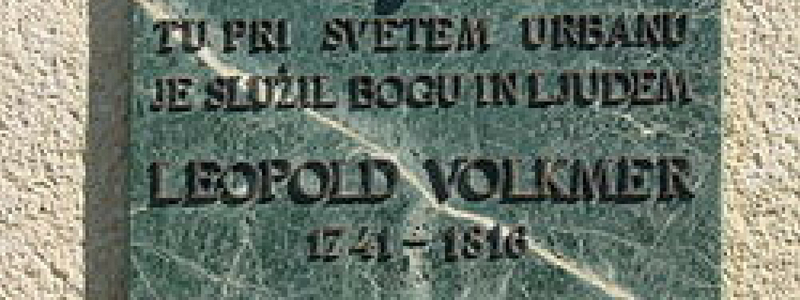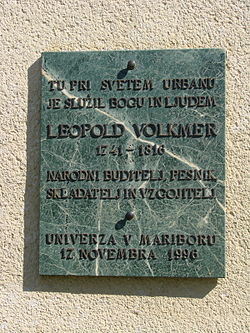The memorial plaque was unveiled in 1996 during a symposium on Leopold Volkmer in Destrnik. It is attached to the rectory wall, and bears the inscription: “Here, in the Parish of Saint Urban, Leopold Volkmer (1741–1816) served God and the people. A national awakener, poet, composer and teacher. University of Maribor, 12 November 1996.”
Leopold Volkmer
A priest, teacher, poet and composer, Leopold Volkmer (1741–1816) imbued his music and poetry with the spirit of national revival and importantly marked the culture of the Slovenian Štajerska (Styria) region as a pioneer of versification (poetry). Considered by some to be the first secular poet of Štajerska, his work has an important place primarily in Slovenian literary history.
He was born in Ljutomer and attended grammar school in Varaždin. He later studied theology and philosophy in Graz. In 1765, Volkmer became the curate in the parish of Saint Oswald in Ptuj, where he was also responsible for educating boys, being appointed the director of a private school after his reassignment to the Ptuj civic parish. In 1784, he was appointed curate of Destrnik, and then served as the curate in Dvorjane until 1808, remaining there after his retirement. In 1812, he returned to Destrnik, where he passed away.
Whilst he was an accomplished teacher, Volkmer attained his greatest distinction with achievements in poetry, translation and composition. His works reflect the influences of Jesuit schooling and views on poetry of the thinkers of the Enlightenment.
Some of his works have survived, i.e. six manuscripts and four print publications. The manuscripts include a transcribed copy of a German song in Gothic script, Der englische Gruss (The Angelic Greeting), the translations Pesem pred naj svetešem zakramenti (A Song Prior to Receiving the Most Sacred of Sacraments, 1809) and Pangelingva (Pange Lingua, 1813), a church hymn book Pesme k božji službi vu rimski katoliški cirkvi (Hymns for a Service of Worship in Roman Catholic Church, 1805) and a hymnal bearing the same name and year of publication, but without the musical notation.
He translated a number of religious songs from German into Slovenian. The hymns Stabat Mater, Dies Irae and Te Deum were sung in his Slovenian translations at places of worship in the environs of Ptuj. Volkmer’s hymnal, Pesme k božji službi vu rimski katoliški cirkvi vekši tal iz nemškega ino latinskega na slovensko prestavlene (Hymns for a Service of Worship in the Roman Catholic Church Translated from German and Latin into Slovenian, 1805), contains 73 Sunday and holiday hymns, 20 Marian songs and 17 hymns for saints’ days. Volkmer furnished the entire Part I song cycle with melodies, while some texts from Parts II and III lack musical notation. Purportedly, only one of these hymns is Volkmer’s original piece, other texts being translations, which, nevertheless, display Volkmer’s subtle grasp of rhyme and a sense of harmonious proportion between the musical and textual fabrics. Sung in church services, these hymns helped spread the Slovenian language in rural eastern Štajerska.
He achieved prominence as an author primarily with his secular output, most notably his first secular poetry collection, which was lauded in literary circles as Maribor’s first Slovenian printed non-religious book. It includes a collection of poems titled Hvala kmetičkega stana ino tobačje trave v dveh pesmah zapojena v leti 1807 v Marburgi (An Ode to Peasanthood and Tobacco Leaves Sung in Two Hymns in the Year of 1807 in Marburg). Part I, Prve pesmi od kmetstva (First Songs of Peasants), contains an ode to the peasantry that was widespread at that time in adaptations and reworkings throughout the greater part of north-east Slovenia. Comprising elements of baroque songs about social class and traces of the folkloric tradition, the ode deals with the life circumstances of peasants and the imperial monopoly on tobacco. Cautioning against violating an imposed regulation, it has a didactic flavour.
Volkmer’s secular manuscripts were compiled in Zmes za pevca I. del (Compilation for a Singer Part I), published in 1836 in Fabule ino Pésmi (Stories and Poems), a book comprising a collection of Volkmer’s works from different periods of his creative life. The collection consists of fables, moral tales, epigrams, didactic and drinking songs, songs traditionally sung at fairs, and reflective poems. The most notable examples include Lipa ali sladka krčma (Lime Tree or a Sweet Tavern) and Hrast ali žalostno ločenje (An Oak Tree or Sad Parting).
Maia Juvanc

